Developing Individuals, Teams & Organisations in HRM Practices
VerifiedAdded on 2024/04/25
|19
|5179
|68
Report
AI Summary
This assignment delves into the critical role of employee development within organizations, emphasizing the importance of aligning individual and team growth with overall business strategy. It begins by analyzing the knowledge, skills, and behaviors (KSBs) required by HR professionals, referencing the CIPD model and highlighting attributes like decisive thinking, skilled influencing, and personal credibility. The report includes a personal skills audit for an HR officer, Jane Cambridge, identifying her training and development needs in areas such as communication, IT skills, and problem-solving. A professional development plan (PDP) is then created for Jane, outlining specific actions to improve her skills and knowledge. Finally, the assignment differentiates between organizational and individual learning, as well as training and development, underscoring the significance of both for sustainable business performance. This document is available on Desklib, a platform offering a wealth of study tools and solved assignments.
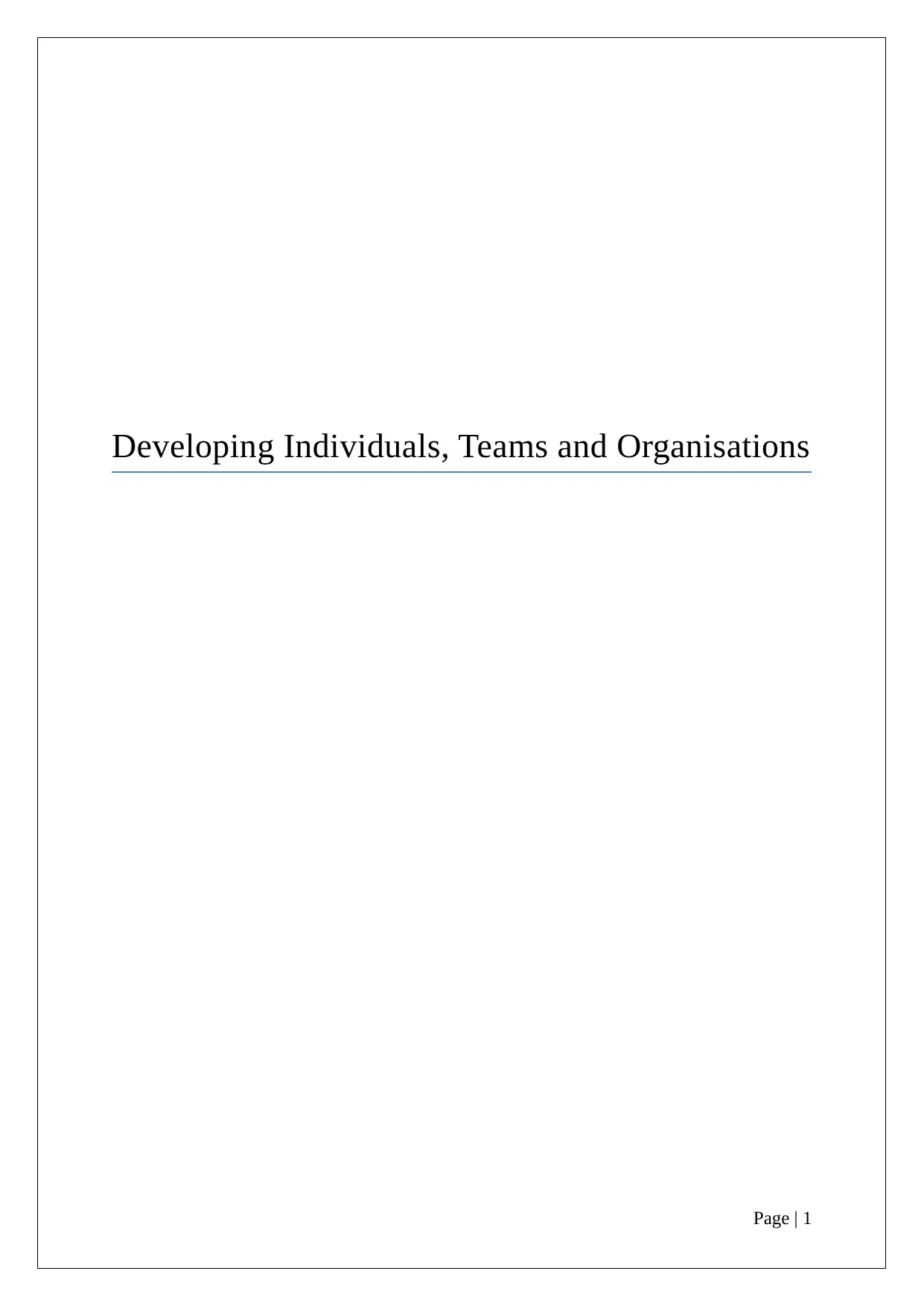
Developing Individuals, Teams and Organisations
Page | 1
Page | 1
Paraphrase This Document
Need a fresh take? Get an instant paraphrase of this document with our AI Paraphraser
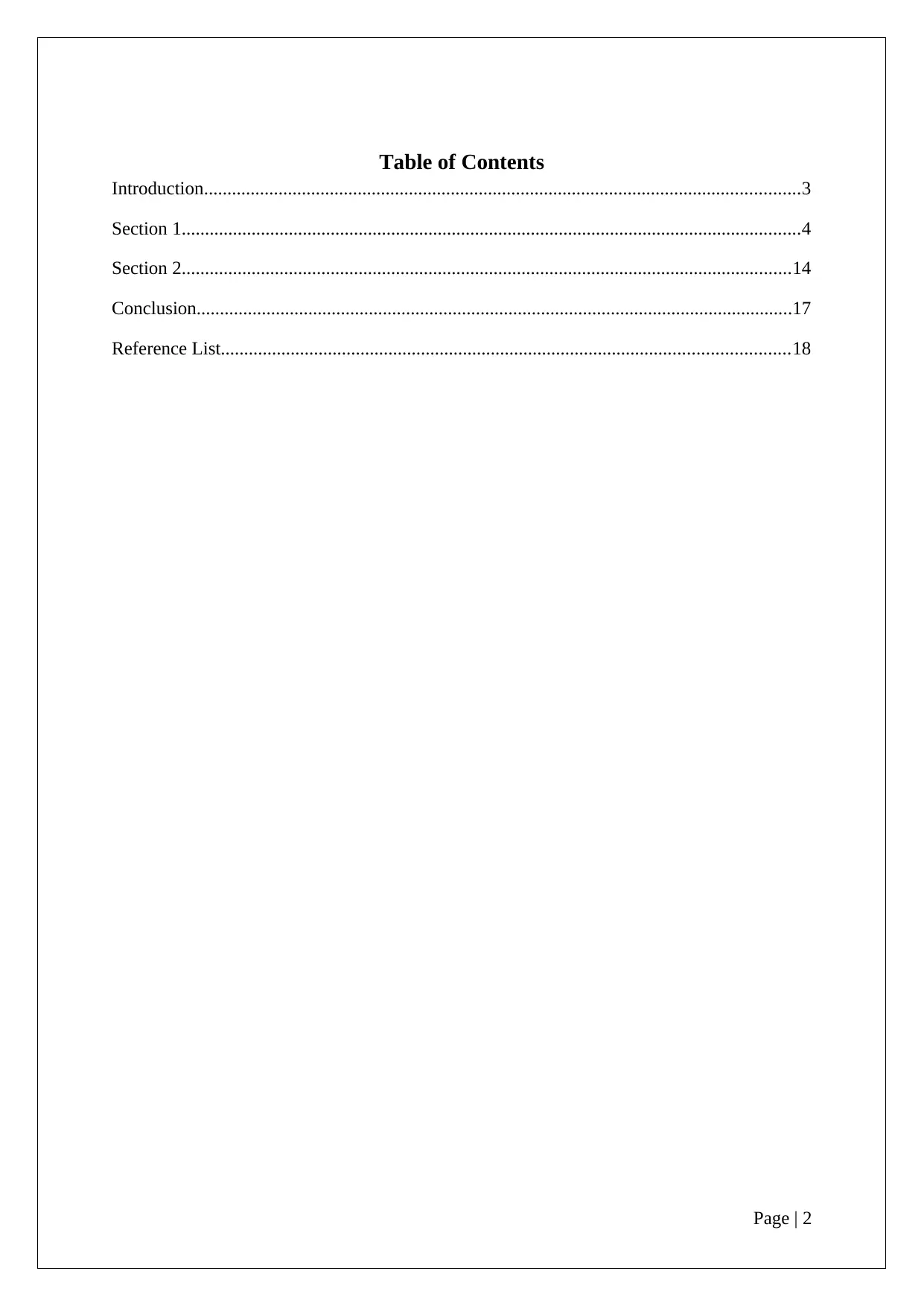
Table of Contents
Introduction................................................................................................................................3
Section 1.....................................................................................................................................4
Section 2...................................................................................................................................14
Conclusion................................................................................................................................17
Reference List..........................................................................................................................18
Page | 2
Introduction................................................................................................................................3
Section 1.....................................................................................................................................4
Section 2...................................................................................................................................14
Conclusion................................................................................................................................17
Reference List..........................................................................................................................18
Page | 2
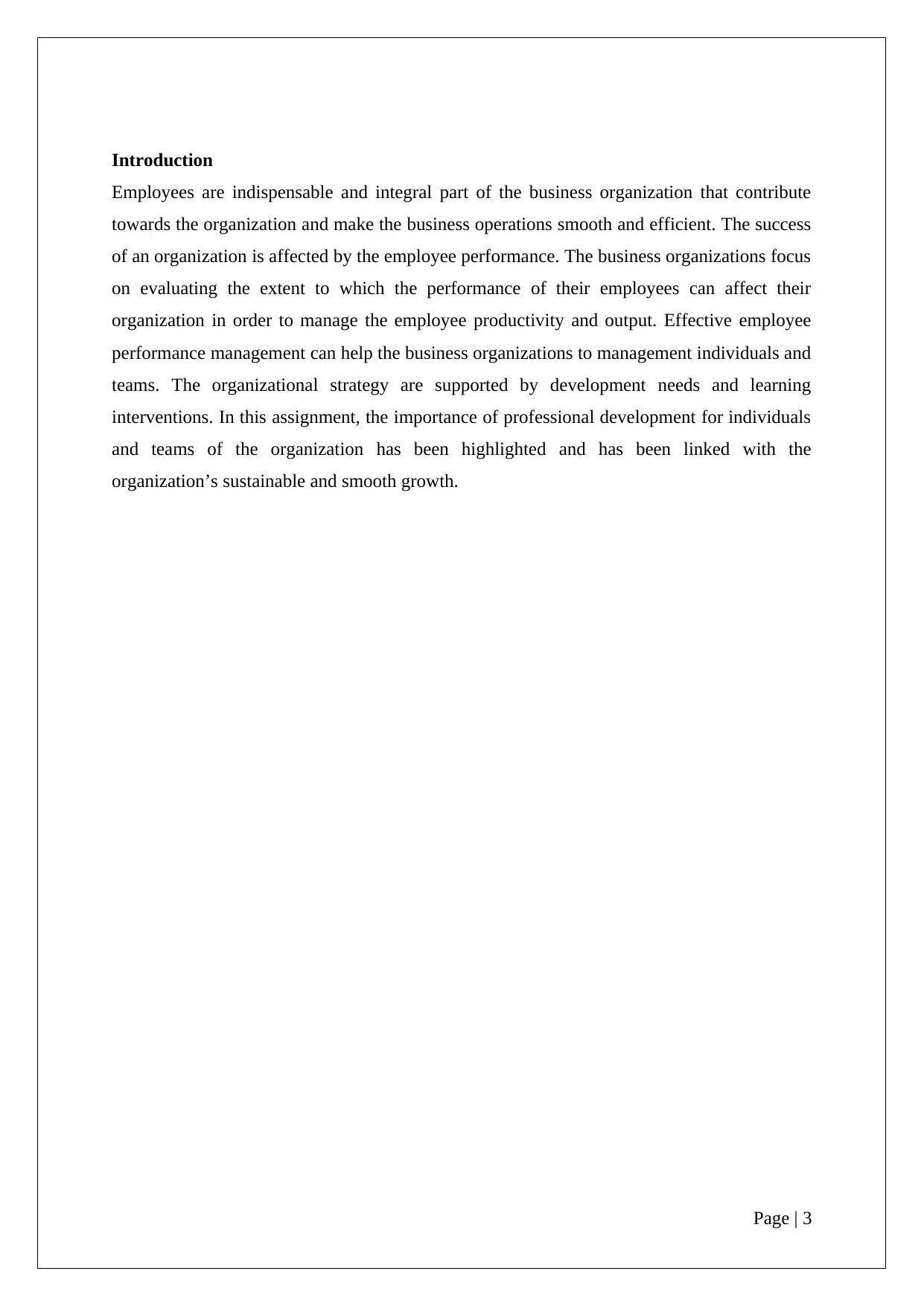
Introduction
Employees are indispensable and integral part of the business organization that contribute
towards the organization and make the business operations smooth and efficient. The success
of an organization is affected by the employee performance. The business organizations focus
on evaluating the extent to which the performance of their employees can affect their
organization in order to manage the employee productivity and output. Effective employee
performance management can help the business organizations to management individuals and
teams. The organizational strategy are supported by development needs and learning
interventions. In this assignment, the importance of professional development for individuals
and teams of the organization has been highlighted and has been linked with the
organization’s sustainable and smooth growth.
Page | 3
Employees are indispensable and integral part of the business organization that contribute
towards the organization and make the business operations smooth and efficient. The success
of an organization is affected by the employee performance. The business organizations focus
on evaluating the extent to which the performance of their employees can affect their
organization in order to manage the employee productivity and output. Effective employee
performance management can help the business organizations to management individuals and
teams. The organizational strategy are supported by development needs and learning
interventions. In this assignment, the importance of professional development for individuals
and teams of the organization has been highlighted and has been linked with the
organization’s sustainable and smooth growth.
Page | 3
⊘ This is a preview!⊘
Do you want full access?
Subscribe today to unlock all pages.

Trusted by 1+ million students worldwide
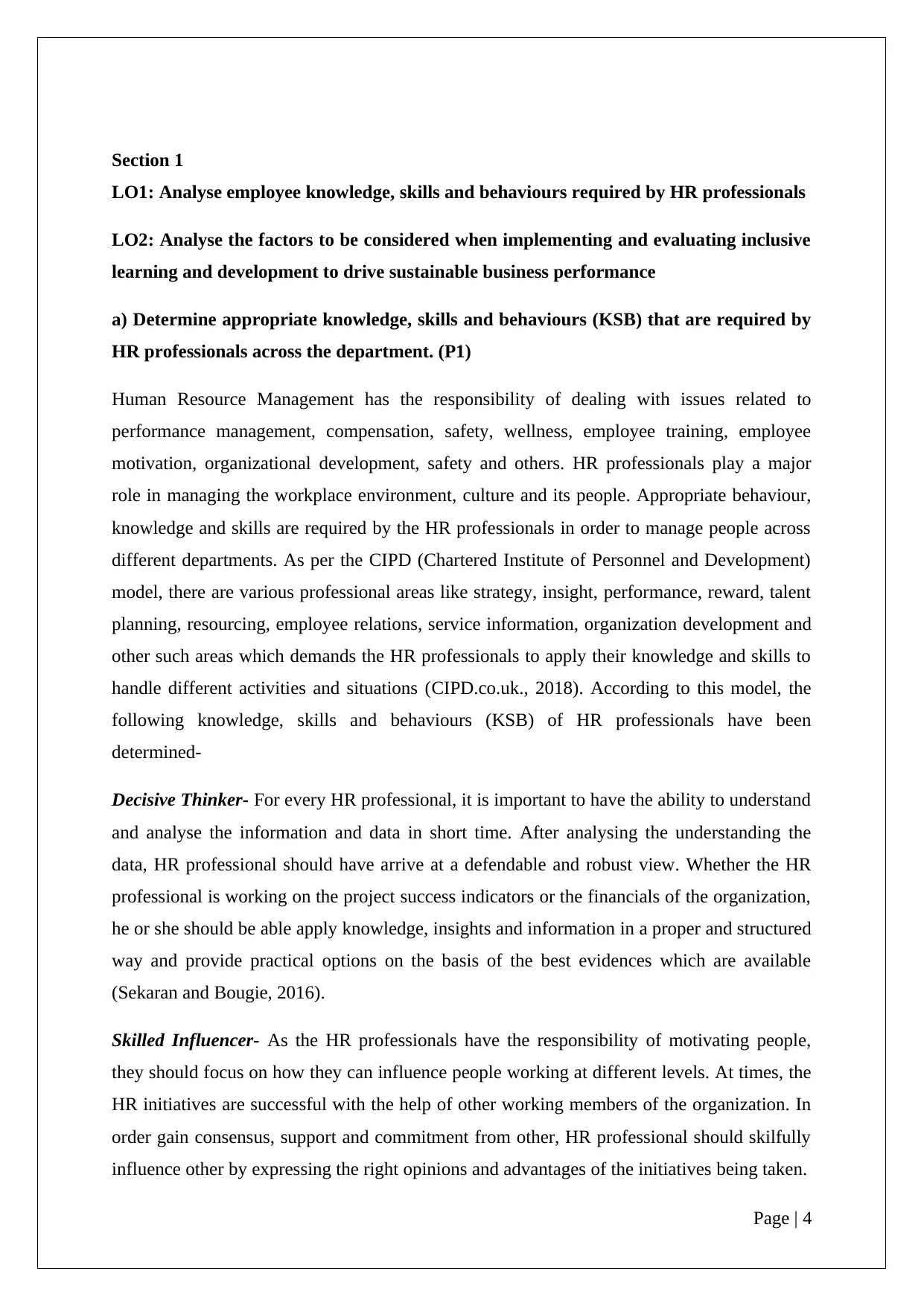
Section 1
LO1: Analyse employee knowledge, skills and behaviours required by HR professionals
LO2: Analyse the factors to be considered when implementing and evaluating inclusive
learning and development to drive sustainable business performance
a) Determine appropriate knowledge, skills and behaviours (KSB) that are required by
HR professionals across the department. (P1)
Human Resource Management has the responsibility of dealing with issues related to
performance management, compensation, safety, wellness, employee training, employee
motivation, organizational development, safety and others. HR professionals play a major
role in managing the workplace environment, culture and its people. Appropriate behaviour,
knowledge and skills are required by the HR professionals in order to manage people across
different departments. As per the CIPD (Chartered Institute of Personnel and Development)
model, there are various professional areas like strategy, insight, performance, reward, talent
planning, resourcing, employee relations, service information, organization development and
other such areas which demands the HR professionals to apply their knowledge and skills to
handle different activities and situations (CIPD.co.uk., 2018). According to this model, the
following knowledge, skills and behaviours (KSB) of HR professionals have been
determined-
Decisive Thinker- For every HR professional, it is important to have the ability to understand
and analyse the information and data in short time. After analysing the understanding the
data, HR professional should have arrive at a defendable and robust view. Whether the HR
professional is working on the project success indicators or the financials of the organization,
he or she should be able apply knowledge, insights and information in a proper and structured
way and provide practical options on the basis of the best evidences which are available
(Sekaran and Bougie, 2016).
Skilled Influencer- As the HR professionals have the responsibility of motivating people,
they should focus on how they can influence people working at different levels. At times, the
HR initiatives are successful with the help of other working members of the organization. In
order gain consensus, support and commitment from other, HR professional should skilfully
influence other by expressing the right opinions and advantages of the initiatives being taken.
Page | 4
LO1: Analyse employee knowledge, skills and behaviours required by HR professionals
LO2: Analyse the factors to be considered when implementing and evaluating inclusive
learning and development to drive sustainable business performance
a) Determine appropriate knowledge, skills and behaviours (KSB) that are required by
HR professionals across the department. (P1)
Human Resource Management has the responsibility of dealing with issues related to
performance management, compensation, safety, wellness, employee training, employee
motivation, organizational development, safety and others. HR professionals play a major
role in managing the workplace environment, culture and its people. Appropriate behaviour,
knowledge and skills are required by the HR professionals in order to manage people across
different departments. As per the CIPD (Chartered Institute of Personnel and Development)
model, there are various professional areas like strategy, insight, performance, reward, talent
planning, resourcing, employee relations, service information, organization development and
other such areas which demands the HR professionals to apply their knowledge and skills to
handle different activities and situations (CIPD.co.uk., 2018). According to this model, the
following knowledge, skills and behaviours (KSB) of HR professionals have been
determined-
Decisive Thinker- For every HR professional, it is important to have the ability to understand
and analyse the information and data in short time. After analysing the understanding the
data, HR professional should have arrive at a defendable and robust view. Whether the HR
professional is working on the project success indicators or the financials of the organization,
he or she should be able apply knowledge, insights and information in a proper and structured
way and provide practical options on the basis of the best evidences which are available
(Sekaran and Bougie, 2016).
Skilled Influencer- As the HR professionals have the responsibility of motivating people,
they should focus on how they can influence people working at different levels. At times, the
HR initiatives are successful with the help of other working members of the organization. In
order gain consensus, support and commitment from other, HR professional should skilfully
influence other by expressing the right opinions and advantages of the initiatives being taken.
Page | 4
Paraphrase This Document
Need a fresh take? Get an instant paraphrase of this document with our AI Paraphraser
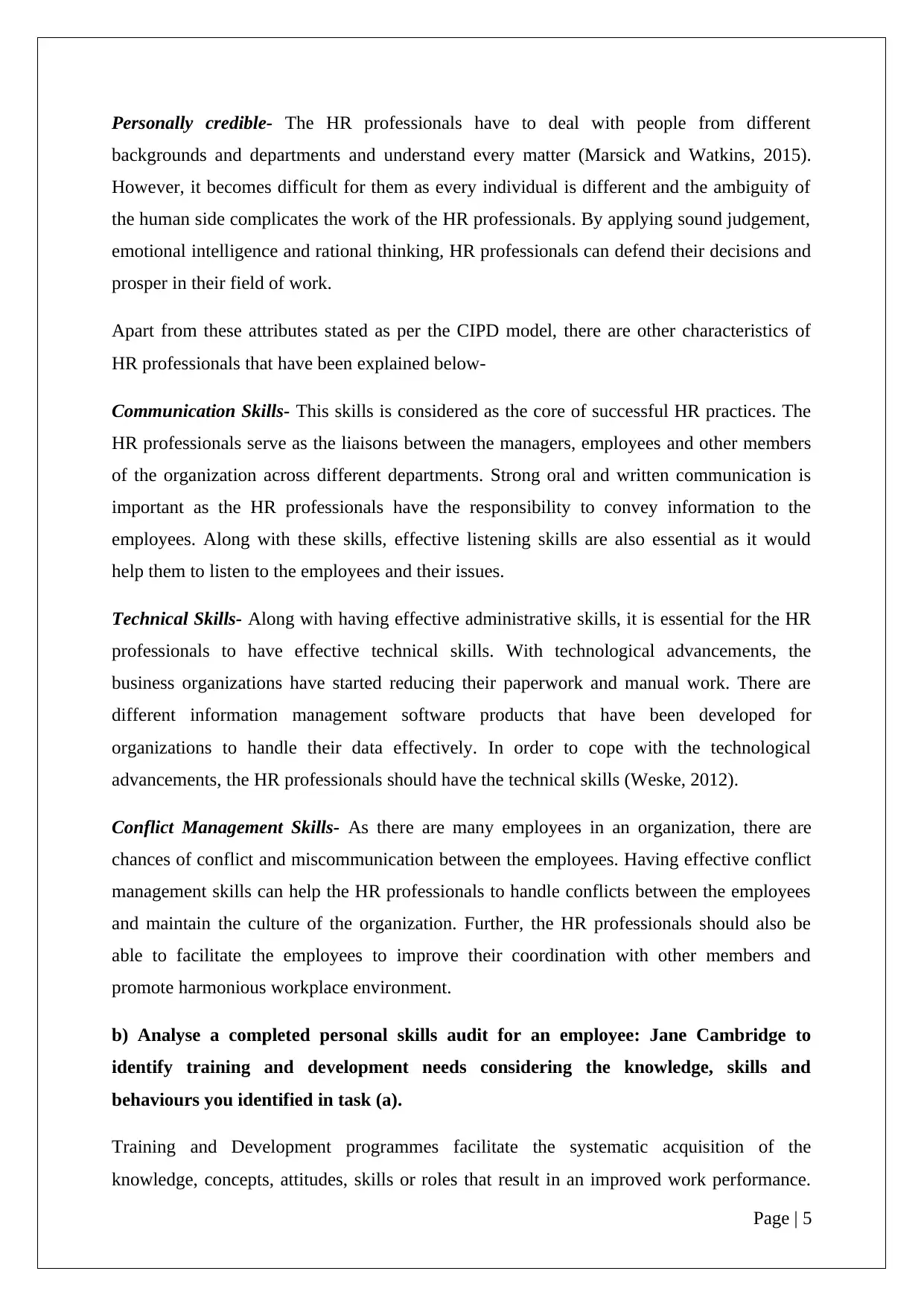
Personally credible- The HR professionals have to deal with people from different
backgrounds and departments and understand every matter (Marsick and Watkins, 2015).
However, it becomes difficult for them as every individual is different and the ambiguity of
the human side complicates the work of the HR professionals. By applying sound judgement,
emotional intelligence and rational thinking, HR professionals can defend their decisions and
prosper in their field of work.
Apart from these attributes stated as per the CIPD model, there are other characteristics of
HR professionals that have been explained below-
Communication Skills- This skills is considered as the core of successful HR practices. The
HR professionals serve as the liaisons between the managers, employees and other members
of the organization across different departments. Strong oral and written communication is
important as the HR professionals have the responsibility to convey information to the
employees. Along with these skills, effective listening skills are also essential as it would
help them to listen to the employees and their issues.
Technical Skills- Along with having effective administrative skills, it is essential for the HR
professionals to have effective technical skills. With technological advancements, the
business organizations have started reducing their paperwork and manual work. There are
different information management software products that have been developed for
organizations to handle their data effectively. In order to cope with the technological
advancements, the HR professionals should have the technical skills (Weske, 2012).
Conflict Management Skills- As there are many employees in an organization, there are
chances of conflict and miscommunication between the employees. Having effective conflict
management skills can help the HR professionals to handle conflicts between the employees
and maintain the culture of the organization. Further, the HR professionals should also be
able to facilitate the employees to improve their coordination with other members and
promote harmonious workplace environment.
b) Analyse a completed personal skills audit for an employee: Jane Cambridge to
identify training and development needs considering the knowledge, skills and
behaviours you identified in task (a).
Training and Development programmes facilitate the systematic acquisition of the
knowledge, concepts, attitudes, skills or roles that result in an improved work performance.
Page | 5
backgrounds and departments and understand every matter (Marsick and Watkins, 2015).
However, it becomes difficult for them as every individual is different and the ambiguity of
the human side complicates the work of the HR professionals. By applying sound judgement,
emotional intelligence and rational thinking, HR professionals can defend their decisions and
prosper in their field of work.
Apart from these attributes stated as per the CIPD model, there are other characteristics of
HR professionals that have been explained below-
Communication Skills- This skills is considered as the core of successful HR practices. The
HR professionals serve as the liaisons between the managers, employees and other members
of the organization across different departments. Strong oral and written communication is
important as the HR professionals have the responsibility to convey information to the
employees. Along with these skills, effective listening skills are also essential as it would
help them to listen to the employees and their issues.
Technical Skills- Along with having effective administrative skills, it is essential for the HR
professionals to have effective technical skills. With technological advancements, the
business organizations have started reducing their paperwork and manual work. There are
different information management software products that have been developed for
organizations to handle their data effectively. In order to cope with the technological
advancements, the HR professionals should have the technical skills (Weske, 2012).
Conflict Management Skills- As there are many employees in an organization, there are
chances of conflict and miscommunication between the employees. Having effective conflict
management skills can help the HR professionals to handle conflicts between the employees
and maintain the culture of the organization. Further, the HR professionals should also be
able to facilitate the employees to improve their coordination with other members and
promote harmonious workplace environment.
b) Analyse a completed personal skills audit for an employee: Jane Cambridge to
identify training and development needs considering the knowledge, skills and
behaviours you identified in task (a).
Training and Development programmes facilitate the systematic acquisition of the
knowledge, concepts, attitudes, skills or roles that result in an improved work performance.
Page | 5
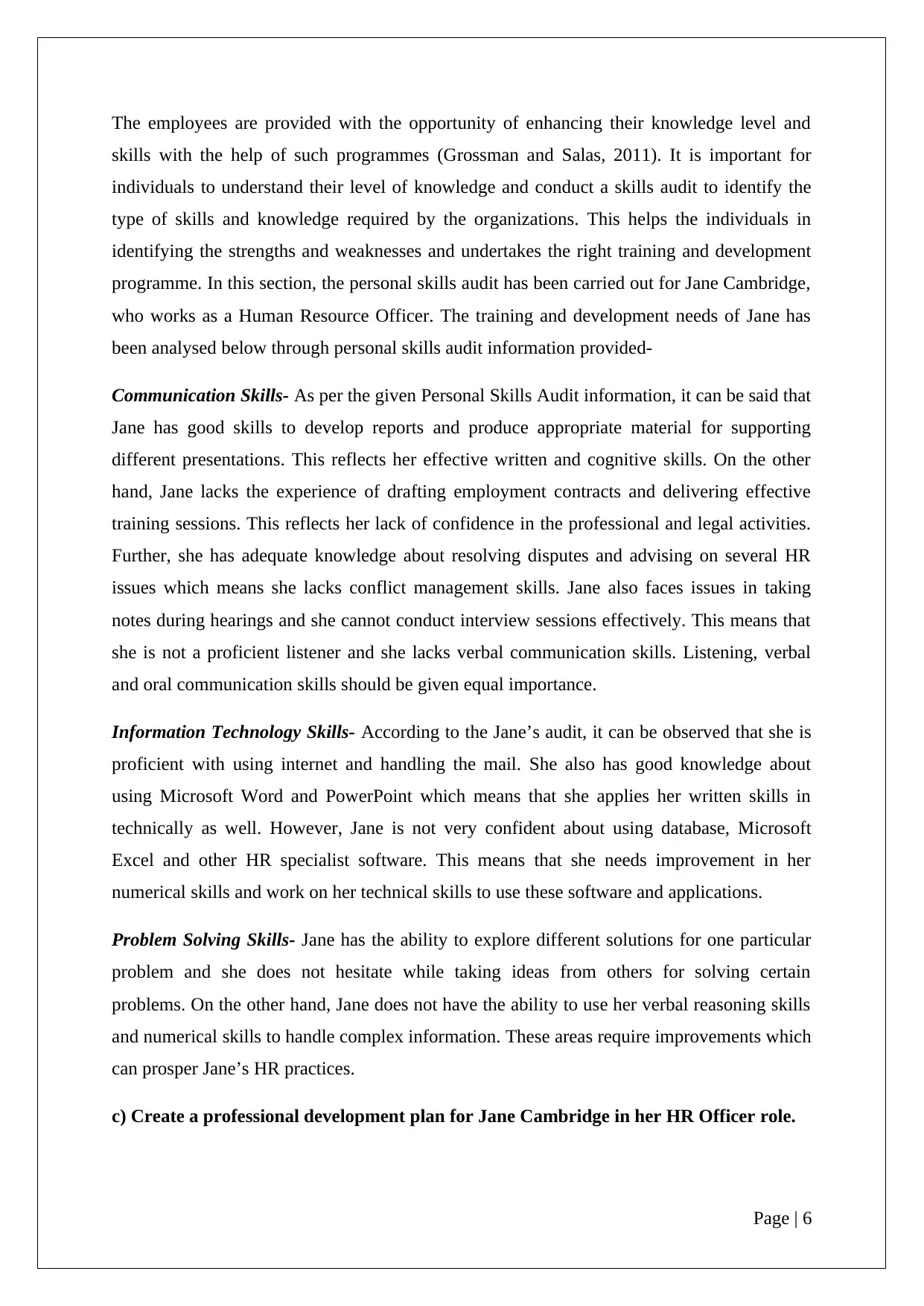
The employees are provided with the opportunity of enhancing their knowledge level and
skills with the help of such programmes (Grossman and Salas, 2011). It is important for
individuals to understand their level of knowledge and conduct a skills audit to identify the
type of skills and knowledge required by the organizations. This helps the individuals in
identifying the strengths and weaknesses and undertakes the right training and development
programme. In this section, the personal skills audit has been carried out for Jane Cambridge,
who works as a Human Resource Officer. The training and development needs of Jane has
been analysed below through personal skills audit information provided-
Communication Skills- As per the given Personal Skills Audit information, it can be said that
Jane has good skills to develop reports and produce appropriate material for supporting
different presentations. This reflects her effective written and cognitive skills. On the other
hand, Jane lacks the experience of drafting employment contracts and delivering effective
training sessions. This reflects her lack of confidence in the professional and legal activities.
Further, she has adequate knowledge about resolving disputes and advising on several HR
issues which means she lacks conflict management skills. Jane also faces issues in taking
notes during hearings and she cannot conduct interview sessions effectively. This means that
she is not a proficient listener and she lacks verbal communication skills. Listening, verbal
and oral communication skills should be given equal importance.
Information Technology Skills- According to the Jane’s audit, it can be observed that she is
proficient with using internet and handling the mail. She also has good knowledge about
using Microsoft Word and PowerPoint which means that she applies her written skills in
technically as well. However, Jane is not very confident about using database, Microsoft
Excel and other HR specialist software. This means that she needs improvement in her
numerical skills and work on her technical skills to use these software and applications.
Problem Solving Skills- Jane has the ability to explore different solutions for one particular
problem and she does not hesitate while taking ideas from others for solving certain
problems. On the other hand, Jane does not have the ability to use her verbal reasoning skills
and numerical skills to handle complex information. These areas require improvements which
can prosper Jane’s HR practices.
c) Create a professional development plan for Jane Cambridge in her HR Officer role.
Page | 6
skills with the help of such programmes (Grossman and Salas, 2011). It is important for
individuals to understand their level of knowledge and conduct a skills audit to identify the
type of skills and knowledge required by the organizations. This helps the individuals in
identifying the strengths and weaknesses and undertakes the right training and development
programme. In this section, the personal skills audit has been carried out for Jane Cambridge,
who works as a Human Resource Officer. The training and development needs of Jane has
been analysed below through personal skills audit information provided-
Communication Skills- As per the given Personal Skills Audit information, it can be said that
Jane has good skills to develop reports and produce appropriate material for supporting
different presentations. This reflects her effective written and cognitive skills. On the other
hand, Jane lacks the experience of drafting employment contracts and delivering effective
training sessions. This reflects her lack of confidence in the professional and legal activities.
Further, she has adequate knowledge about resolving disputes and advising on several HR
issues which means she lacks conflict management skills. Jane also faces issues in taking
notes during hearings and she cannot conduct interview sessions effectively. This means that
she is not a proficient listener and she lacks verbal communication skills. Listening, verbal
and oral communication skills should be given equal importance.
Information Technology Skills- According to the Jane’s audit, it can be observed that she is
proficient with using internet and handling the mail. She also has good knowledge about
using Microsoft Word and PowerPoint which means that she applies her written skills in
technically as well. However, Jane is not very confident about using database, Microsoft
Excel and other HR specialist software. This means that she needs improvement in her
numerical skills and work on her technical skills to use these software and applications.
Problem Solving Skills- Jane has the ability to explore different solutions for one particular
problem and she does not hesitate while taking ideas from others for solving certain
problems. On the other hand, Jane does not have the ability to use her verbal reasoning skills
and numerical skills to handle complex information. These areas require improvements which
can prosper Jane’s HR practices.
c) Create a professional development plan for Jane Cambridge in her HR Officer role.
Page | 6
⊘ This is a preview!⊘
Do you want full access?
Subscribe today to unlock all pages.

Trusted by 1+ million students worldwide
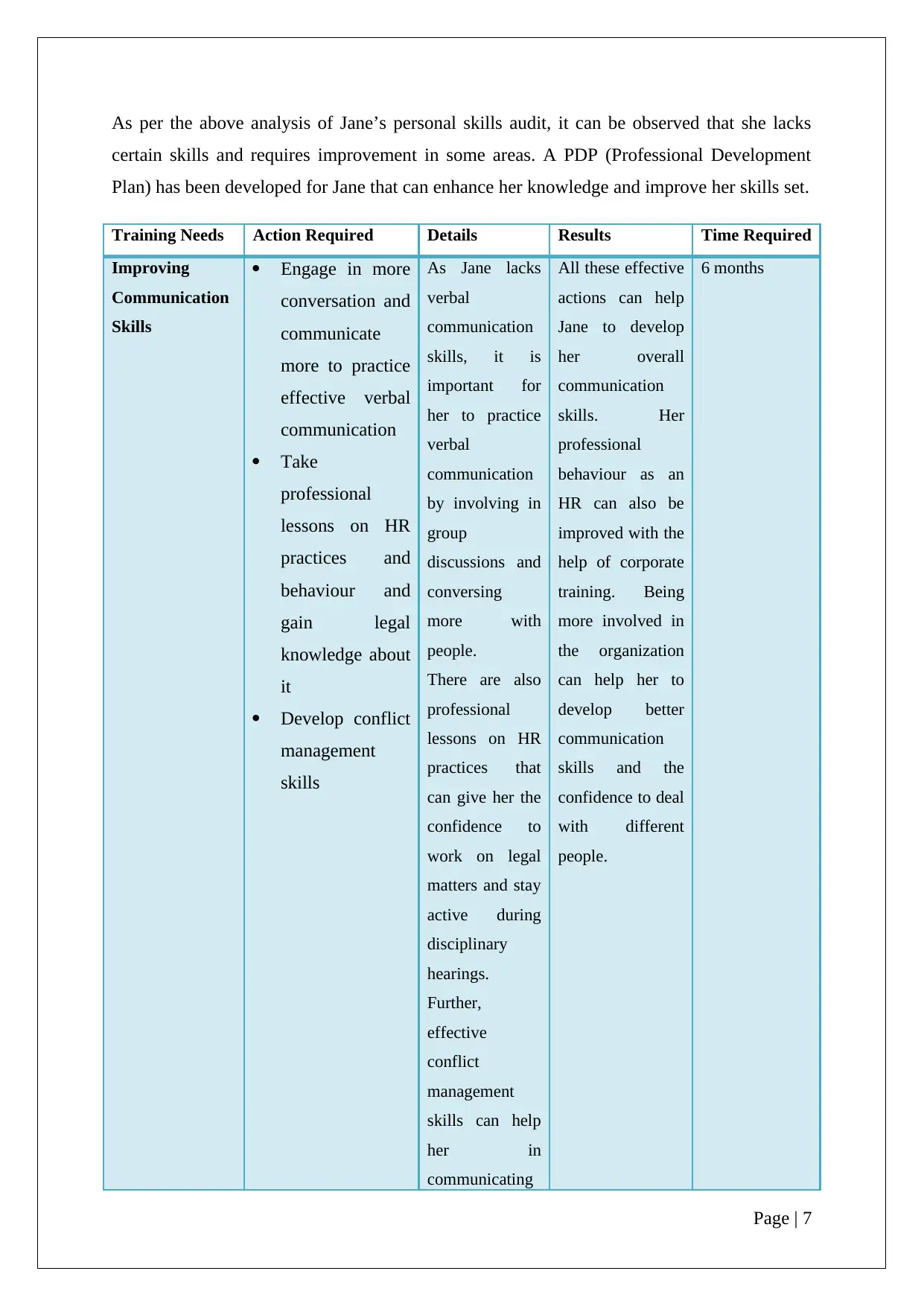
As per the above analysis of Jane’s personal skills audit, it can be observed that she lacks
certain skills and requires improvement in some areas. A PDP (Professional Development
Plan) has been developed for Jane that can enhance her knowledge and improve her skills set.
Training Needs Action Required Details Results Time Required
Improving
Communication
Skills
Engage in more
conversation and
communicate
more to practice
effective verbal
communication
Take
professional
lessons on HR
practices and
behaviour and
gain legal
knowledge about
it
Develop conflict
management
skills
As Jane lacks
verbal
communication
skills, it is
important for
her to practice
verbal
communication
by involving in
group
discussions and
conversing
more with
people.
There are also
professional
lessons on HR
practices that
can give her the
confidence to
work on legal
matters and stay
active during
disciplinary
hearings.
Further,
effective
conflict
management
skills can help
her in
communicating
All these effective
actions can help
Jane to develop
her overall
communication
skills. Her
professional
behaviour as an
HR can also be
improved with the
help of corporate
training. Being
more involved in
the organization
can help her to
develop better
communication
skills and the
confidence to deal
with different
people.
6 months
Page | 7
certain skills and requires improvement in some areas. A PDP (Professional Development
Plan) has been developed for Jane that can enhance her knowledge and improve her skills set.
Training Needs Action Required Details Results Time Required
Improving
Communication
Skills
Engage in more
conversation and
communicate
more to practice
effective verbal
communication
Take
professional
lessons on HR
practices and
behaviour and
gain legal
knowledge about
it
Develop conflict
management
skills
As Jane lacks
verbal
communication
skills, it is
important for
her to practice
verbal
communication
by involving in
group
discussions and
conversing
more with
people.
There are also
professional
lessons on HR
practices that
can give her the
confidence to
work on legal
matters and stay
active during
disciplinary
hearings.
Further,
effective
conflict
management
skills can help
her in
communicating
All these effective
actions can help
Jane to develop
her overall
communication
skills. Her
professional
behaviour as an
HR can also be
improved with the
help of corporate
training. Being
more involved in
the organization
can help her to
develop better
communication
skills and the
confidence to deal
with different
people.
6 months
Page | 7
Paraphrase This Document
Need a fresh take? Get an instant paraphrase of this document with our AI Paraphraser
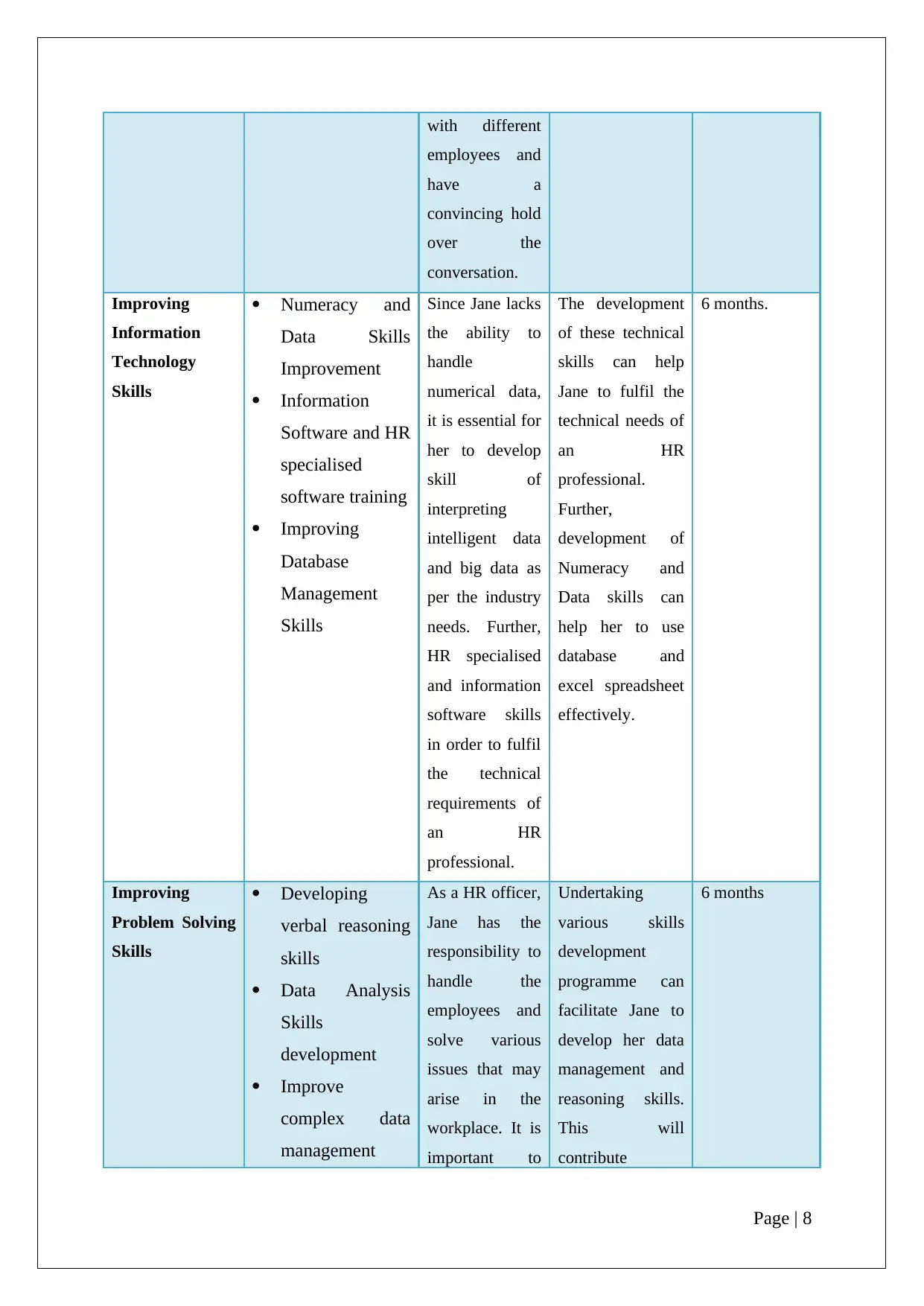
with different
employees and
have a
convincing hold
over the
conversation.
Improving
Information
Technology
Skills
Numeracy and
Data Skills
Improvement
Information
Software and HR
specialised
software training
Improving
Database
Management
Skills
Since Jane lacks
the ability to
handle
numerical data,
it is essential for
her to develop
skill of
interpreting
intelligent data
and big data as
per the industry
needs. Further,
HR specialised
and information
software skills
in order to fulfil
the technical
requirements of
an HR
professional.
The development
of these technical
skills can help
Jane to fulfil the
technical needs of
an HR
professional.
Further,
development of
Numeracy and
Data skills can
help her to use
database and
excel spreadsheet
effectively.
6 months.
Improving
Problem Solving
Skills
Developing
verbal reasoning
skills
Data Analysis
Skills
development
Improve
complex data
management
As a HR officer,
Jane has the
responsibility to
handle the
employees and
solve various
issues that may
arise in the
workplace. It is
important to
Undertaking
various skills
development
programme can
facilitate Jane to
develop her data
management and
reasoning skills.
This will
contribute
6 months
Page | 8
employees and
have a
convincing hold
over the
conversation.
Improving
Information
Technology
Skills
Numeracy and
Data Skills
Improvement
Information
Software and HR
specialised
software training
Improving
Database
Management
Skills
Since Jane lacks
the ability to
handle
numerical data,
it is essential for
her to develop
skill of
interpreting
intelligent data
and big data as
per the industry
needs. Further,
HR specialised
and information
software skills
in order to fulfil
the technical
requirements of
an HR
professional.
The development
of these technical
skills can help
Jane to fulfil the
technical needs of
an HR
professional.
Further,
development of
Numeracy and
Data skills can
help her to use
database and
excel spreadsheet
effectively.
6 months.
Improving
Problem Solving
Skills
Developing
verbal reasoning
skills
Data Analysis
Skills
development
Improve
complex data
management
As a HR officer,
Jane has the
responsibility to
handle the
employees and
solve various
issues that may
arise in the
workplace. It is
important to
Undertaking
various skills
development
programme can
facilitate Jane to
develop her data
management and
reasoning skills.
This will
contribute
6 months
Page | 8
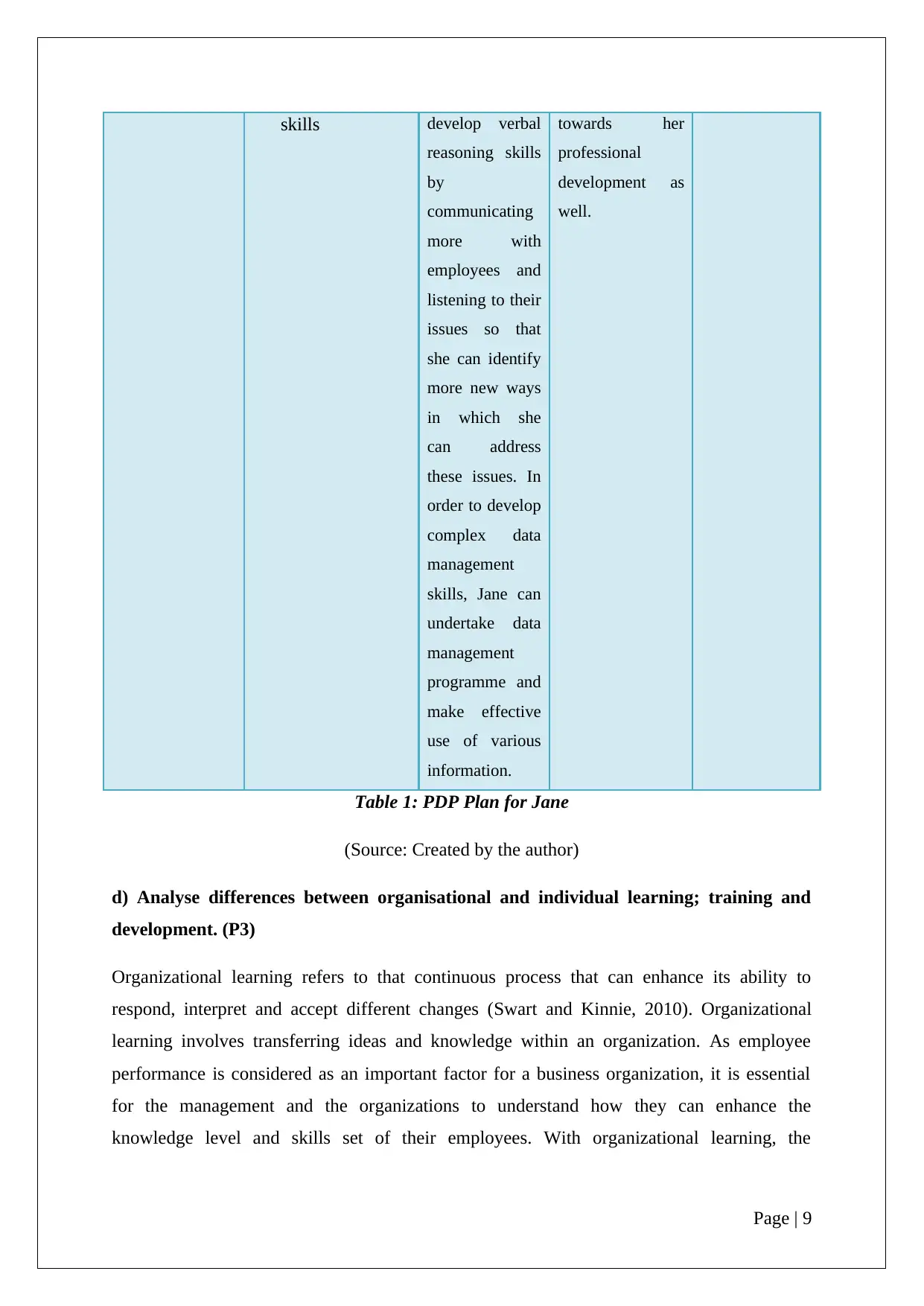
skills develop verbal
reasoning skills
by
communicating
more with
employees and
listening to their
issues so that
she can identify
more new ways
in which she
can address
these issues. In
order to develop
complex data
management
skills, Jane can
undertake data
management
programme and
make effective
use of various
information.
towards her
professional
development as
well.
Table 1: PDP Plan for Jane
(Source: Created by the author)
d) Analyse differences between organisational and individual learning; training and
development. (P3)
Organizational learning refers to that continuous process that can enhance its ability to
respond, interpret and accept different changes (Swart and Kinnie, 2010). Organizational
learning involves transferring ideas and knowledge within an organization. As employee
performance is considered as an important factor for a business organization, it is essential
for the management and the organizations to understand how they can enhance the
knowledge level and skills set of their employees. With organizational learning, the
Page | 9
reasoning skills
by
communicating
more with
employees and
listening to their
issues so that
she can identify
more new ways
in which she
can address
these issues. In
order to develop
complex data
management
skills, Jane can
undertake data
management
programme and
make effective
use of various
information.
towards her
professional
development as
well.
Table 1: PDP Plan for Jane
(Source: Created by the author)
d) Analyse differences between organisational and individual learning; training and
development. (P3)
Organizational learning refers to that continuous process that can enhance its ability to
respond, interpret and accept different changes (Swart and Kinnie, 2010). Organizational
learning involves transferring ideas and knowledge within an organization. As employee
performance is considered as an important factor for a business organization, it is essential
for the management and the organizations to understand how they can enhance the
knowledge level and skills set of their employees. With organizational learning, the
Page | 9
⊘ This is a preview!⊘
Do you want full access?
Subscribe today to unlock all pages.

Trusted by 1+ million students worldwide
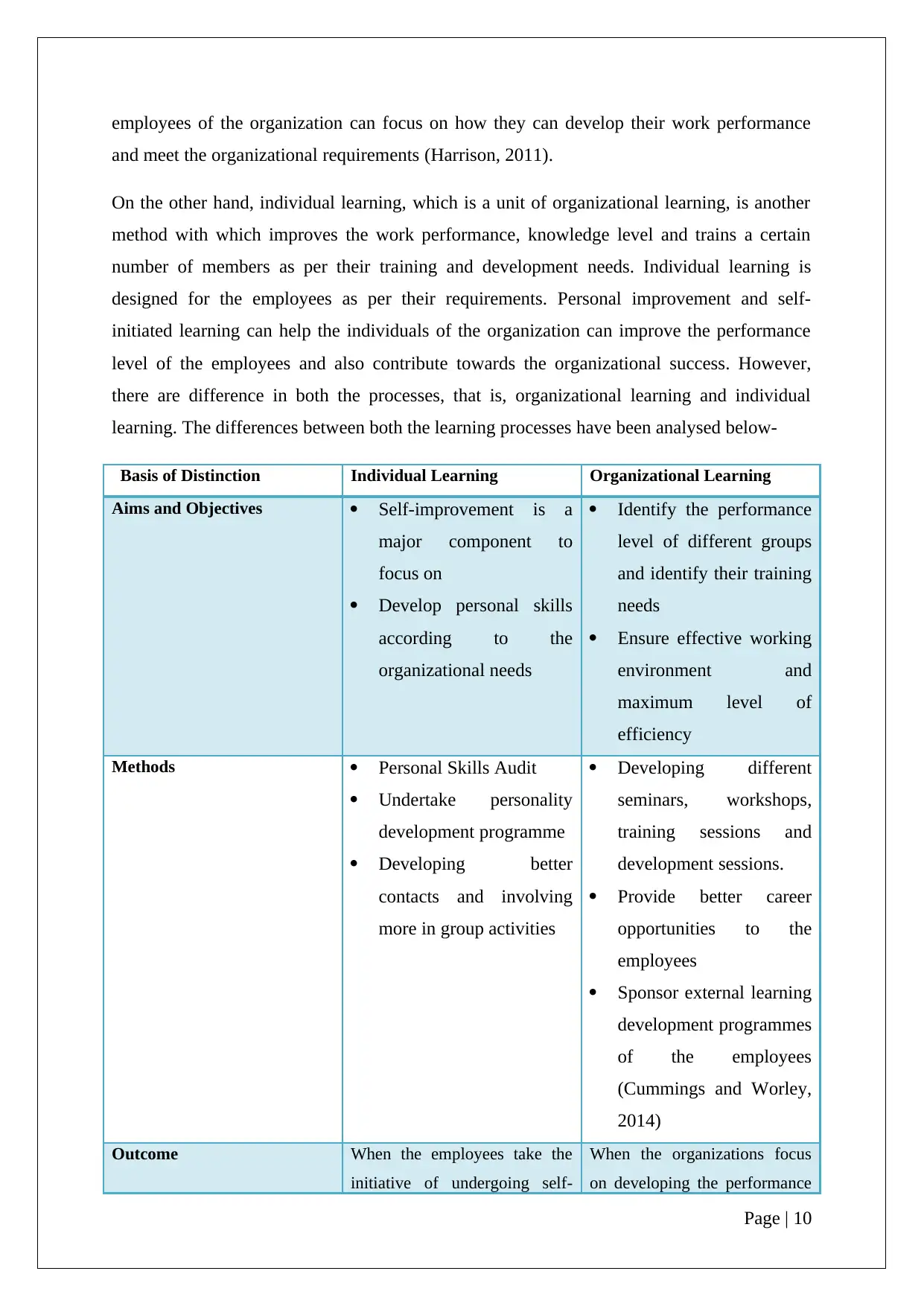
employees of the organization can focus on how they can develop their work performance
and meet the organizational requirements (Harrison, 2011).
On the other hand, individual learning, which is a unit of organizational learning, is another
method with which improves the work performance, knowledge level and trains a certain
number of members as per their training and development needs. Individual learning is
designed for the employees as per their requirements. Personal improvement and self-
initiated learning can help the individuals of the organization can improve the performance
level of the employees and also contribute towards the organizational success. However,
there are difference in both the processes, that is, organizational learning and individual
learning. The differences between both the learning processes have been analysed below-
Basis of Distinction Individual Learning Organizational Learning
Aims and Objectives Self-improvement is a
major component to
focus on
Develop personal skills
according to the
organizational needs
Identify the performance
level of different groups
and identify their training
needs
Ensure effective working
environment and
maximum level of
efficiency
Methods Personal Skills Audit
Undertake personality
development programme
Developing better
contacts and involving
more in group activities
Developing different
seminars, workshops,
training sessions and
development sessions.
Provide better career
opportunities to the
employees
Sponsor external learning
development programmes
of the employees
(Cummings and Worley,
2014)
Outcome When the employees take the
initiative of undergoing self-
When the organizations focus
on developing the performance
Page | 10
and meet the organizational requirements (Harrison, 2011).
On the other hand, individual learning, which is a unit of organizational learning, is another
method with which improves the work performance, knowledge level and trains a certain
number of members as per their training and development needs. Individual learning is
designed for the employees as per their requirements. Personal improvement and self-
initiated learning can help the individuals of the organization can improve the performance
level of the employees and also contribute towards the organizational success. However,
there are difference in both the processes, that is, organizational learning and individual
learning. The differences between both the learning processes have been analysed below-
Basis of Distinction Individual Learning Organizational Learning
Aims and Objectives Self-improvement is a
major component to
focus on
Develop personal skills
according to the
organizational needs
Identify the performance
level of different groups
and identify their training
needs
Ensure effective working
environment and
maximum level of
efficiency
Methods Personal Skills Audit
Undertake personality
development programme
Developing better
contacts and involving
more in group activities
Developing different
seminars, workshops,
training sessions and
development sessions.
Provide better career
opportunities to the
employees
Sponsor external learning
development programmes
of the employees
(Cummings and Worley,
2014)
Outcome When the employees take the
initiative of undergoing self-
When the organizations focus
on developing the performance
Page | 10
Paraphrase This Document
Need a fresh take? Get an instant paraphrase of this document with our AI Paraphraser
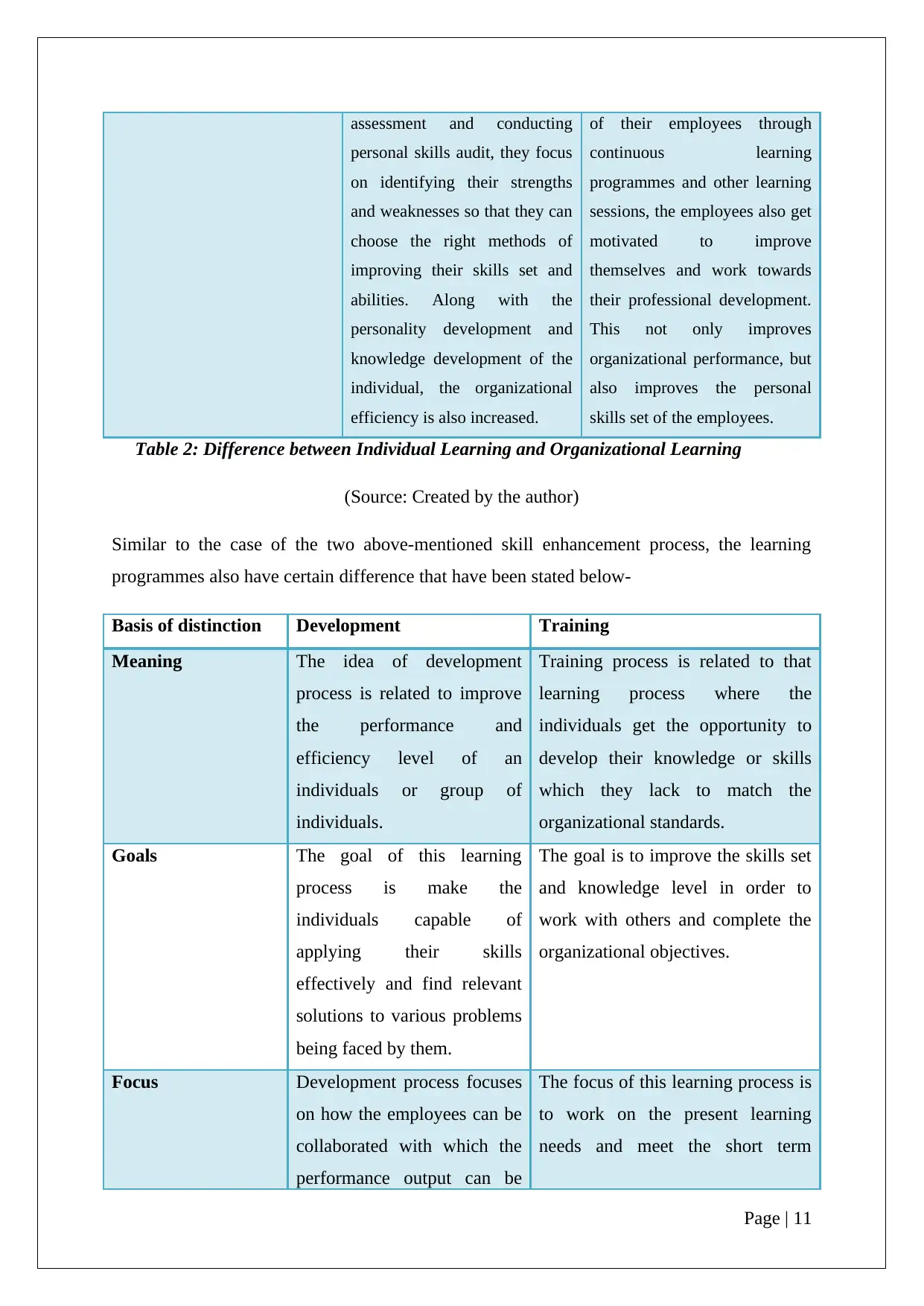
assessment and conducting
personal skills audit, they focus
on identifying their strengths
and weaknesses so that they can
choose the right methods of
improving their skills set and
abilities. Along with the
personality development and
knowledge development of the
individual, the organizational
efficiency is also increased.
of their employees through
continuous learning
programmes and other learning
sessions, the employees also get
motivated to improve
themselves and work towards
their professional development.
This not only improves
organizational performance, but
also improves the personal
skills set of the employees.
Table 2: Difference between Individual Learning and Organizational Learning
(Source: Created by the author)
Similar to the case of the two above-mentioned skill enhancement process, the learning
programmes also have certain difference that have been stated below-
Basis of distinction Development Training
Meaning The idea of development
process is related to improve
the performance and
efficiency level of an
individuals or group of
individuals.
Training process is related to that
learning process where the
individuals get the opportunity to
develop their knowledge or skills
which they lack to match the
organizational standards.
Goals The goal of this learning
process is make the
individuals capable of
applying their skills
effectively and find relevant
solutions to various problems
being faced by them.
The goal is to improve the skills set
and knowledge level in order to
work with others and complete the
organizational objectives.
Focus Development process focuses
on how the employees can be
collaborated with which the
performance output can be
The focus of this learning process is
to work on the present learning
needs and meet the short term
Page | 11
personal skills audit, they focus
on identifying their strengths
and weaknesses so that they can
choose the right methods of
improving their skills set and
abilities. Along with the
personality development and
knowledge development of the
individual, the organizational
efficiency is also increased.
of their employees through
continuous learning
programmes and other learning
sessions, the employees also get
motivated to improve
themselves and work towards
their professional development.
This not only improves
organizational performance, but
also improves the personal
skills set of the employees.
Table 2: Difference between Individual Learning and Organizational Learning
(Source: Created by the author)
Similar to the case of the two above-mentioned skill enhancement process, the learning
programmes also have certain difference that have been stated below-
Basis of distinction Development Training
Meaning The idea of development
process is related to improve
the performance and
efficiency level of an
individuals or group of
individuals.
Training process is related to that
learning process where the
individuals get the opportunity to
develop their knowledge or skills
which they lack to match the
organizational standards.
Goals The goal of this learning
process is make the
individuals capable of
applying their skills
effectively and find relevant
solutions to various problems
being faced by them.
The goal is to improve the skills set
and knowledge level in order to
work with others and complete the
organizational objectives.
Focus Development process focuses
on how the employees can be
collaborated with which the
performance output can be
The focus of this learning process is
to work on the present learning
needs and meet the short term
Page | 11
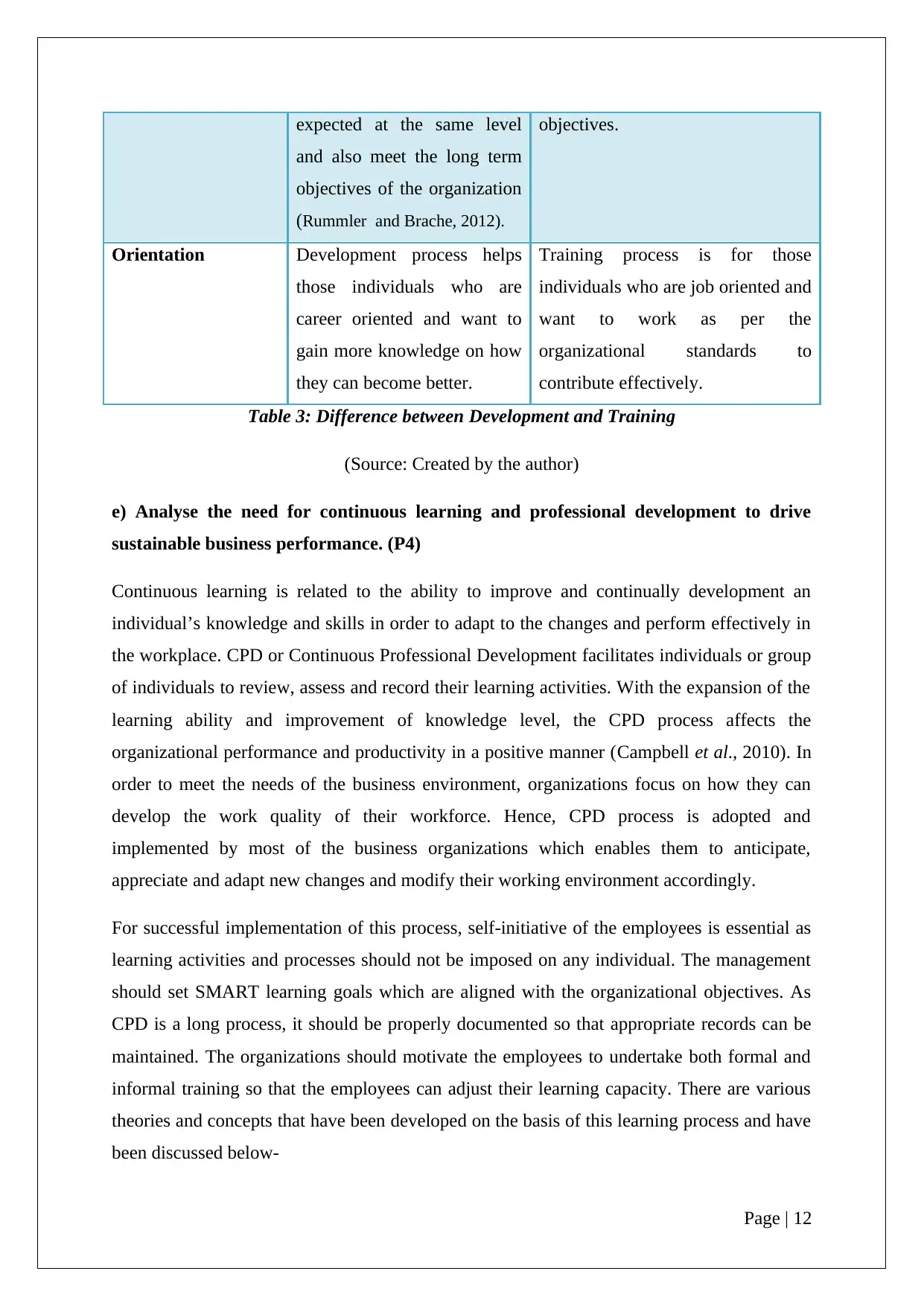
expected at the same level
and also meet the long term
objectives of the organization
(Rummler and Brache, 2012).
objectives.
Orientation Development process helps
those individuals who are
career oriented and want to
gain more knowledge on how
they can become better.
Training process is for those
individuals who are job oriented and
want to work as per the
organizational standards to
contribute effectively.
Table 3: Difference between Development and Training
(Source: Created by the author)
e) Analyse the need for continuous learning and professional development to drive
sustainable business performance. (P4)
Continuous learning is related to the ability to improve and continually development an
individual’s knowledge and skills in order to adapt to the changes and perform effectively in
the workplace. CPD or Continuous Professional Development facilitates individuals or group
of individuals to review, assess and record their learning activities. With the expansion of the
learning ability and improvement of knowledge level, the CPD process affects the
organizational performance and productivity in a positive manner (Campbell et al., 2010). In
order to meet the needs of the business environment, organizations focus on how they can
develop the work quality of their workforce. Hence, CPD process is adopted and
implemented by most of the business organizations which enables them to anticipate,
appreciate and adapt new changes and modify their working environment accordingly.
For successful implementation of this process, self-initiative of the employees is essential as
learning activities and processes should not be imposed on any individual. The management
should set SMART learning goals which are aligned with the organizational objectives. As
CPD is a long process, it should be properly documented so that appropriate records can be
maintained. The organizations should motivate the employees to undertake both formal and
informal training so that the employees can adjust their learning capacity. There are various
theories and concepts that have been developed on the basis of this learning process and have
been discussed below-
Page | 12
and also meet the long term
objectives of the organization
(Rummler and Brache, 2012).
objectives.
Orientation Development process helps
those individuals who are
career oriented and want to
gain more knowledge on how
they can become better.
Training process is for those
individuals who are job oriented and
want to work as per the
organizational standards to
contribute effectively.
Table 3: Difference between Development and Training
(Source: Created by the author)
e) Analyse the need for continuous learning and professional development to drive
sustainable business performance. (P4)
Continuous learning is related to the ability to improve and continually development an
individual’s knowledge and skills in order to adapt to the changes and perform effectively in
the workplace. CPD or Continuous Professional Development facilitates individuals or group
of individuals to review, assess and record their learning activities. With the expansion of the
learning ability and improvement of knowledge level, the CPD process affects the
organizational performance and productivity in a positive manner (Campbell et al., 2010). In
order to meet the needs of the business environment, organizations focus on how they can
develop the work quality of their workforce. Hence, CPD process is adopted and
implemented by most of the business organizations which enables them to anticipate,
appreciate and adapt new changes and modify their working environment accordingly.
For successful implementation of this process, self-initiative of the employees is essential as
learning activities and processes should not be imposed on any individual. The management
should set SMART learning goals which are aligned with the organizational objectives. As
CPD is a long process, it should be properly documented so that appropriate records can be
maintained. The organizations should motivate the employees to undertake both formal and
informal training so that the employees can adjust their learning capacity. There are various
theories and concepts that have been developed on the basis of this learning process and have
been discussed below-
Page | 12
⊘ This is a preview!⊘
Do you want full access?
Subscribe today to unlock all pages.

Trusted by 1+ million students worldwide
1 out of 19
Related Documents
Your All-in-One AI-Powered Toolkit for Academic Success.
+13062052269
info@desklib.com
Available 24*7 on WhatsApp / Email
![[object Object]](/_next/static/media/star-bottom.7253800d.svg)
Unlock your academic potential
Copyright © 2020–2026 A2Z Services. All Rights Reserved. Developed and managed by ZUCOL.





